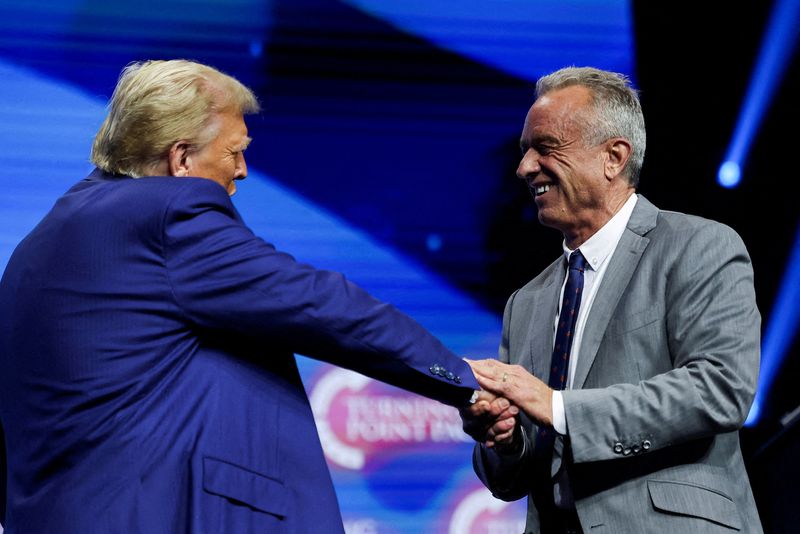By James Oliphant
WASHINGTON (Reuters) - President-elect Donald Trump’s willingness to choose cabinet members with histories of alleged sexual misconduct threw his transition plans off course this week.
Matt Gaetz, Trump’s pick for attorney general, dropped out of consideration on Thursday amid mounting questions over allegations of having sex with an underage girl and illicit drug use. He has denied wrongdoing.
His withdrawal underscores the risk of Trump's approach to staffing his second administration. He appears to be emboldened by his political comeback and willing to challenge the Senate Republicans to back some unorthodox picks.
Gaetz's departure leaves two other cabinet candidates who also have been accused of sexual misconduct: Pete Hegseth, nominated to run the Pentagon, and Robert F. Kennedy, Jr., Trump’s choice for Health and Human Services secretary.
While allegations of sexual misconduct are not uncommon in politics, including against Trump himself, it is unusual for cabinet nominees to face such accusations.
Some Republican senators said Hegseth in particular would now face more scrutiny with Gaetz out of the mix, though they did not think the extra attention would hurt his confirmation prospects.
"You guys will look more and more on what happened and will understand it's completely taken out of context, and I think Pete will get confirmed at the end of the day," Senator Markwayne Mullin, a Trump ally, told reporters.
Hegseth, a 44-year-old military veteran and former Fox News host, has been accused by a woman who told police he sexually assaulted her at a conference in California in 2017. No charges were filed, and Hegseth and his attorney have said the sexual encounter was consensual.
Hegseth met with Republican senators on Capitol Hill on Thursday to rally support for his nomination as news of Gaetz's withdrawal broke.
Senator Jack Reed, the outgoing Democratic chair of the Senate Armed Services Committee, said the stumble with Gaetz means the allegation against Hegseth will need to be closely vetted.
“From what I’ve seen from news reports, it is very concerning. It has to be looked at," Reed told reporters.
REMINDER OF #METOO
Asked by Reuters this week whether Trump was reconsidering his choices of Hegseth and Kennedy, the president-elect's transition team issued statements in support of both men.
It called Kennedy a respected leader and Hegseth "an incredibly tough and smart candidate."
Reuters was not able to contact Hegseth for a comment about this story. A spokesperson for Kennedy did not immediately respond. Trump's transition team did not immediately reply to a request for comment on Friday about the specific allegations against the pair.
Kennedy, 70, has emerged as a key adviser to Trump on health policy. His family’s live-in babysitter accused him of groping her in 1999, when she was 23. No charges were filed.
Kennedy told his accuser, in a text message previously seen by Reuters, that he did not recall the incident. The woman showed Reuters the text in July after she made her claims about Kennedy public.
When asked to comment on the sexual assault allegation, Kennedy told a podcaster in July: "I have so many skeletons in my closet that if they could all vote, I could run for king of the world."
It is not clear how big a role the 1999 alleged incident will play in the Senate confirmation hearings of Kennedy, who is under fire from Democrats for spreading misinformation on vaccines.
"This is something that I'm sure will be explored at the hearings," Senator Susan Collins, a moderate Republican, said when asked by reporters if she was concerned about the number of nominees facing sexual misconduct allegations.
Trump has his own well-documented history of alleged misconduct, which he denies.
Last year, a New York jury found him liable for the sexual abuse of a writer, E. Jean Carroll, and awarded her damages. She was one of more than a dozen women who have accused Trump of sexual assault or harassment.
His nominations of Gaetz, Hegseth and Kennedy represent a cultural counter-strike to the country's #MeToo movement, which saw women accuse hundreds of men in entertainment, media, politics and other fields of sexual misconduct, said Juliet Williams, a professor of gender studies at the University of California, Los Angeles.
Trump’s picks endorse the idea that “that kind of sexual behavior is the entitlement of male privilege," Williams said in reference to the #MeToo accusations.
Bill Dailey, a fellow at the Nicola Center for Ethics and Culture at University of Notre Dame, said Gaetz's withdrawal showed that some of Washington's checks and balances were still working.
Even as Trump has threatened to demolish institutional norms by pushing the limits of his presidential authority, there was resistance among some Senate Republicans to confirm him.
“That (Gaetz) didn’t even make it to December shows the Senate isn’t simply going to rubber stamp Trump, as one would expect them to do if autocracy were imminent,” Dailey said.
As the focus turns to Hegseth, Republican Senator Mike Braun likened the allegations against him to those faced by Brett Kavanaugh, a Trump-appointed justice on the U.S. Supreme Court.

Kavanaugh was accused during his 2018 Senate confirmation hearing of sexually assaulting a woman while in high school. He was ultimately confirmed after Senate Republicans said that the accuser’s allegations could not be corroborated.
Braun predicted a similar fate for Hegseth: “I'm sure that will go through hearings, but I imagine he'll survive it."